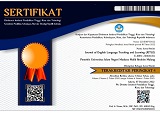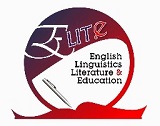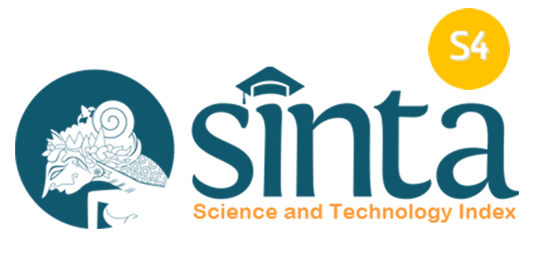Remote Teaching Strategies in Writing Skill Development Due to Covid-19 Pandemic
Abstract
Covid-19 pandemic inevitably affects educational practices including in teaching writing. It leads to the unfamiliar challenges for those who are in charge, in this case English instructors. Conducted using descriptive qualitative design, this study aims at describing teaching writing strategies to make high-impact improvement for students' writing performance despite their teaching and learning process has to deal with technological and technical challenges. Thus, the researchers suggested several points to focus on; they were punchy topic selection, meaningful purpose, detailed instruction, excellent feedback, peer review to improve metacognition, and reasonable-targetted grading. The researchers found that teaching strategies that were reasonably effective in virtual classroom were choosing punchy topic to gather the students' interest in developing their writing, delivering meaningful purpose of writing to set the boundaries to make a high quality writing, preparing detailed instruction to minimize any misinterpretation from the students, giving excellent feedback so that the students' writing were thoroughly appreciated and corrected, including peer review section to gain metacognition practice, and setting reasonable-targetted grading to motivate the students without giving burden. Even though the strategies may be particular to remote context, additional research result in face-to-face setting is welcomed to enrich the knowledge development especially in teaching writing.
Keywords
Full Text:
PDFReferences
Anderson, P., Anson, C. M., Gonyea, R. M., & Paine, C. (2015). The contributions of writing to learning and development: results from a large-scale multi-institutional study. Research in the Teaching of English.
Borgman, J., & Mcardle, C. (2021). Personal, accessible, responsive, strategic: resources and strategies for online writing instructors.
Cho, K., MacArthur, C. (2010). Student revision with peer and expert reviewing. Learning and Instruction, 20(4), 328–338. https://doi.org/https://psycnet.apa.org/doi/10.1016/j.learninstruc.2009.08.006
Cho, Y.H., Cho, K. (2010). Peer reviewers learn from giving comments. Instructional Science, 39(5), 629–643. https://doi.org/http://dx.doi.org/10.1007/s11251-010-9146-1
Dowd, J. E., Connolly, M. P., Thompson, R. J., & Reynolds, J. A. (2015). Improved reasoning in undergraduate writing through structured workshops. Journal of Economic Education, 46(1), 14–27. https://doi.org/10.1080/00220485.2014.978924
Feuerherm, E. (2012). Written feedback, student writing, and institutional policies: implications for novice teacher development. CATESOL Journal, 23(1), 132–154.
Finkenstaedt-Quinn, S. A., Synder-White, E. P., Connor, M. C., Gere, A. R., Shultz, G. V. (2019). Charaterizing peer review comments and revision from a writing-to-learn assignment focused on lewis structures. Journal of Chemical Education, 96(2), 227–237. https://doi.org/http://dx.doi.org/10.1021/acs.jchemed.8b00711
Halim, A. S., Finkenstaedt-Quinn, S. A., Olsen, L. J., Gere, A. R., & Shultz, G. V. (2018). Identifying and remediating student misconceptions in introductory biology via writing-to-learn assignments and peer review. CBE Life Sciences Education, 17(2), 1–12. https://doi.org/10.1187/cbe.17-10-0212
Husniyah, A. (2018). Blended learning in EFL classrooms with slow internet: insights from teachers and students. Proceedings of the Fourth International Conference on English Across Cultures, 68–79.
Li, L., Liu, X., & Steckelberg, A. L. (2010). Assessor or assessee: How student learning improves by giving and receiving peer feedback. British Journal of Educational Technology, 41(3), 525–536. https://doi.org/10.1111/j.1467-8535.2009.00968.x
Loertscher, J., Green, D., Lewis, J. E., Lin, S., & Minderhout, V. (2014). Identification of threshold concepts for biochemistry. CBE Life Sciences Education, 13(3), 516–528. https://doi.org/10.1187/cbe.14-04-0066
Lundstrom, K., & Baker, W. (2009). To give is better than to receive: The benefits of peer review to the reviewer’s own writing. Journal of Second Language Writing, 18(1), 30–43. https://doi.org/10.1016/j.jslw.2008.06.002
Melzer, D. (2014). Assignments across the curriculum: a national study of college writing.
Meyer, J. H. F., & Land, R. (2005). Threshold concepts and troublesome knowledge (2): Epistemological considerations and a conceptual framework for teaching and learning. Higher Education, 49(3), 373–388. https://doi.org/10.1007/s10734-004-6779-5
Mulia, N. A. (2020). Indonesian EFL students’ engagament in online language learning platform. Research on English Language Teaching in Indonesia, 8(2), 154–163.
Reynolds, J. A., Cai, V., Choi, J., Faller, S., Hu, M., Kozhumam, A., Schwartzman, J., & Vohra, A. (2020). Teaching during a pandemic: Using high-impact writing assignments to balance rigor, engagement, flexibility, and workload. Ecology and Evolution, 10(22), 12573–12580. https://doi.org/10.1002/ece3.6776
Reynolds, J. A., Thaiss, C., Katkin, W., & Thompson, R. J. (2012). Writing-to-learn in undergraduate science education: A community-based, conceptually driven approach. CBE Life Sciences Education, 11(1), 17–25. https://doi.org/10.1187/cbe.11-08-0064
Rosman, P. (2013). Some aspects of ict integration into education. Proceedings of the Information and Communication Technology in Education 2013 Conference, 252–260.
DOI: https://doi.org/10.18860/jetle.v3i1.11959
Refbacks
- There are currently no refbacks.
Jalan Gajayana 50 Malang 65144, Jawa Timur, Indonesia

This work is licensed under a Creative Commons Attribution-ShareAlike 4.0 International License.
Indexed by





